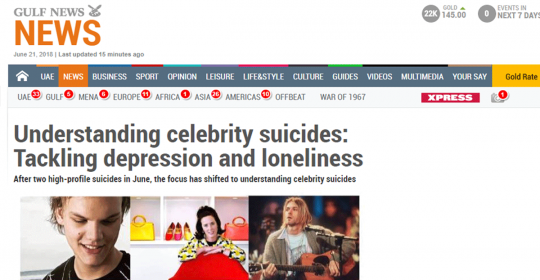
Understanding celebrity suicides – Gulf News Talks With Psychiatrist Dr. Daniela Graf
June saw two high-profile suicides happen within three days of each other – fashion designer and entrepreneur Kate Spade, and chef and TV host Anthony Bourdain. While it has once again brought the focus of the public eye on mental health issues including depression, this is no new ball game. Just earlier this year, Avicii – world-renowned DJ and music producer – took his own life, shocking fans worldwide.
Suicide is not a new issue, especially not in celebrity circles. These tragic deaths are also not limited by lines of work, ranging from boxers, designers, politicians and writers to actors, musicians and entrepreneurs. […]
Living with depression: Here’s how you can make a difference
The sky has not been drained of colour, nor have the flowers lost their charm. It’s just that it doesn’t matter anymore. Heavy limbs and a weighed down body. A mind that will not stop with negative self-talk. Guilt, hollowness, a persistent need/want/desire to STOP.
If this describes you, take time to evaluate what’s going on. You may be depressed. Talk to someone you trust and think of going to a professional – there’s no substitute for an objective listener with no agenda and no judgement when dealing with depression.
While the road to normalcy may seem like a never-ending roller coaster, there are a few things you can do, to minimise the hiccups, to maximize the recovery.
But first, what are the symptoms of sadness?
In terms of mood, explains Dr Jihene, “The person will feel helplessness, persistently sad and [anxious]. Sometimes, you will meet someone who will say they are feeling empty. Those people can also experience some irritability. And guilt…always thinking that he [or she] is the problem.
”In terms of cognitive behaviour, one may notice poor concentration and memory. “A lot of children with a depression are misdiagnosed with an ADHD,” says Dr Daniela Graf, from German Neuroscience Centre.
What is ADHD? It refers to a brain disorder, attention-deficit/hyperactivity, which is marked by twitchiness. An ongoing pattern of inattention and/or hyperactivity-impulsiveness that interferes with functioning or development, explains the US’s National Institute of Mental Health.
Other symptoms of depression include loss of interest in things that once gave you joy. “Withdrawal from friends and family. We will also feel energy loss, the changing of [eating patterns, sleeping patterns]. Headaches, digestive problems, or cramps,”. It’s also at this point that one may dabble with substance abuse. When consumption patterns change, especially if they veer towards the unhealthy, the recoil is physical, sometimes painful.
Did you know?
“Tummy ache is one of the most common symptoms in depressive children [who are] often misdiagnosed as food intolerance or irritable bowel syndrome,” says Dr Graf.
Feeling low?
Dr Jihene and Dr Graf prescribe what you can do to cope with the darkness.
Exercise
“You can go for walks-it’s not [just about] having a hard exercise. For example, 30 minutes of walk every day. It will bring us [in contact with] fresh oxygen…When our mind is well [oxygenated] we can think better,” says Dr Jihene.
Diet
“Balance your food intake. Eat many antioxidants [they combat free radicals in the body]. Like chickpeas, split peas, lentils, mixed nuts, fish, eggs, etc. which will bring balance to your body and help to increase serotonin. Soya milk [and soya products] that are rich in Vitamin B12,” says Dr Jihene
Take care of someone else
Dr Graf says caring for a pet in [the case of] animal-loving children can have positive effects.
A dose of Vitamin D
Short spots of sun bathing every day to increase the vitamin D production comes recommended by Dr Graf.
Meditation
Even 15 minutes of it. “Meditation will help us to reduce anxiety and then it will help us to maybe focus on the most important things that we should do- being calm and being with ourselves and thinking what I have to do to make things better for me,” says Dr Jihene.
Reduce screen-time
“Screens are very harmful, for our eyes and also for our minds, because they are full of information and we cannot handle all of it, so maybe just put down the screen for a little and keep on listening to music that will relax you. Or maybe try some reading,” she adds.
Never isolate yourself from your friends
Both doctors underscore the importance of company. “Even if there is no real desire to go out, you have to force yourself out, because it’s the only way to keep socialising,”
The full original article was published in Gulf News

